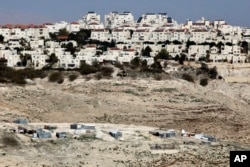For three decades, the West and the international community saw the idea of two states — one Israeli, one Palestinian — as the basis for peace in the Middle East. Even after Hamas' October 7 massacre and Israel's overwhelming counter-offensive, many believe it remains the only path forward.
More than 1,200 people were killed and 242 abducted in the attack on Israel by Hamas, a U.S.-designated terrorist organization. Israel's military response has claimed more than 11,000 lives, according to Gaza's Health Ministry.
Yet political scientist Uriel Abulof of Tel Aviv University believes the massive loss of life on both sides has not made peace impossible.
"A two-state solution is still possible, perhaps more than before, because there is a potential for both sides to understand that this is not a conflict between the majority of Israelis and Palestinians, [both of whom] want to live in coexistence, without radical leaders," he said.
"On one side you have Hamas, which you have to deal with militarily, and on the other side are Benjamin Netanyahu and his coalition, which need to be dealt with politically," he told VOA. "If this happens — and I put a big question mark there — there are better chances for a solution."
Hussein Ibish of the Washington-based Arab Gulf States Institute also believes that a permanent solution to the decades-long conflict is possible only with a two-state model.
"Maybe it will have to be done in stages, but with two states as a common goal that is explicitly outlined from the beginning," said Ibish, who believes even that initial step has specific prerequisites.
"Israel must finally and formally accept the Palestinian right to a state and the need for it. The construction and establishment of settlements must stop completely," he said.
Conversely, Ibish told VOA, Palestinians need to condemn the Hamas attacks of October 7 and vow cessation of hostilities, while the Palestinian Authority must be politically strengthened.
Actionable plan or fig leaf?
Other experts are skeptical. Omer Bartov, a professor of Holocaust and genocide studies at Brown University, describes the two-state plan as a proverbial fig leaf.
"People talk about a two-state solution because they have to talk about something, and that's the only plan currently on the table," he told VOA. "Only Palestinians would live in a Palestinian state, and only Jews would live in Israel."
Bartov believes the two-state plan is unrealistic because it would make for an economically weak Palestine that is dependent on Israel, and "because there are between half-a-million and 750,000 Jewish settlers in the West Bank, and their removal from the territory would mean civil war."
He notes there are also 2 million Palestinians who already live in Israel.
Israel captured the West Bank, along with East Jerusalem, from Jordan in the Six-Day War of 1967. It took Gaza from Egypt in the same war but withdrew from the territory in 2005.
"There is another option, and it was talked about before this happened," said Bartov. "It is not something that can happen quickly, but the possibility should be considered. And that is a kind of confederation of Israeli and Palestinian states, within the borders of 1967."
A single confederated state, he said, would enable the return of Palestinian refugees whose ancestors left certain territories in 1948, and "Jerusalem could be the common capital."
"There would be a difference between citizenship and residence," said Bartov. "Jewish settlers could continue to live in the Palestinian state but behave according to its regulations. And the Palestinians could return from exile and live, for example, in Haifa."
The single-state solution "currently seems like madness" given the current hostilities, he said, adding that continuing violence leads only to "the erosion of democracy in Israeli society" along with the surfacing of "authoritarian" and even "racist elements."
US role seen as crucial
Ibish of the Arab Gulf States Institute says U.S. involvement would be crucial to any permanent solution to the conflict.
"The U.S. is the only foreign power that has the influence and power to be the guarantor of [a two-state] peace agreement," he said. "Unfortunately, the U.S. domestic political scene undermines its role in this regard because it is politically too expensive to put serious pressure on Israel."
Abulof of Tel Aviv University says President Joe Biden must take the lead and use the "stick and carrot" principle for both sides.
"He can tell Israel that he will fully support them and give them security guarantees, and take care of Iran and Hezbollah," said Abulof, adding that Biden would then need to promise U.S.-financed "democratization to the Palestinians."
If Israel doesn't agree to this plan, he says, the U.S. could threaten not to use its veto power in the U.N. Security Council to stop anti-Israeli resolutions.
Bartov of Brown University agrees that no plan can be implemented without the U.S. support on which Israel depends politically and militarily.
Without it, he suggested, the nightmare of endless warfare only continues.
"It's kind of a dream for both Jews and Palestinians — many hope that they'll just wake up one morning and find that the other side is gone," he said.
"But no one leaves. Everyone is there, making life miserable for each other and living in fear. They really don't feel there is hope. That's why the perspective must be changed — how to make these two groups of people live side by side, not apart."







